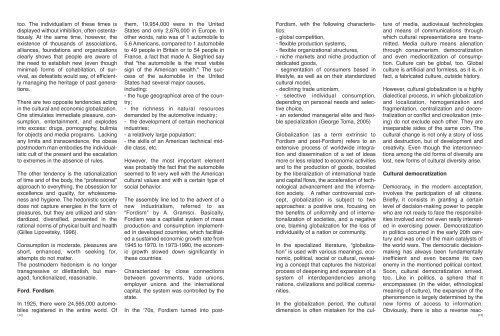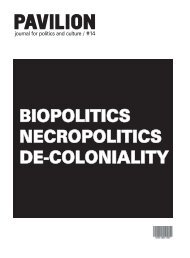Download pdf version of issue no. 16 (4 Mb) - Pavilion
Download pdf version of issue no. 16 (4 Mb) - Pavilion
Download pdf version of issue no. 16 (4 Mb) - Pavilion
You also want an ePaper? Increase the reach of your titles
YUMPU automatically turns print PDFs into web optimized ePapers that Google loves.
too. The individualism <strong>of</strong> these times is<br />
displayed without inhibition, <strong>of</strong>ten ostentatiously.<br />
At the same time, however, the<br />
existence <strong>of</strong> thousands <strong>of</strong> associations,<br />
alliances, foundations and organizations<br />
clearly shows that people are aware <strong>of</strong><br />
the need to establish new (even though<br />
minimal) forms <strong>of</strong> cohabitation, <strong>of</strong> survival,<br />
as defeatists would say, <strong>of</strong> efficiently<br />
managing the heritage <strong>of</strong> past generations.<br />
There are two opposite tendencies acting<br />
in the cultural and eco<strong>no</strong>mic globalization.<br />
One stimulates immediate pleasure, consumption,<br />
entertainment, and explodes<br />
into excess: drugs, por<strong>no</strong>graphy, bulimia<br />
for objects and media programs. Lacking<br />
any limits and transcendence, the obese<br />
postmodern man embodies the individualistic<br />
cult <strong>of</strong> the present and the escalation<br />
to extremes in the absence <strong>of</strong> rules.<br />
The other tendency is the rationalization<br />
<strong>of</strong> time and <strong>of</strong> the body, the “pr<strong>of</strong>essional”<br />
approach to everything, the obsession for<br />
excellence and quality, for wholesomeness<br />
and hygiene. The hedonistic society<br />
does <strong>no</strong>t capture energies in the form <strong>of</strong><br />
pleasures, but they are utilized and standardized,<br />
diversified, presented in the<br />
rational <strong>no</strong>rms <strong>of</strong> physical built and health<br />
(Gilles Lipovetsky, 1996).<br />
Consumption is moderate, pleasures are<br />
short, enhanced, worth seeking for,<br />
attempts do <strong>no</strong>t matter.<br />
The postmodern hedonism is <strong>no</strong> longer<br />
transgressive or dilettantish, but managed,<br />
functionalized, reasonable.<br />
Ford. Fordism<br />
In 1925, there were 24,565,000 automobiles<br />
registered in the entire world. Of<br />
[12]<br />
them, 19,954,000 were in the United<br />
States and only 2,676,000 in Europe. In<br />
other words, ratio was <strong>of</strong> 1 automobile to<br />
5.6 Americans, compared to 1 automobile<br />
to 49 people in Britain or to 54 people in<br />
France, a fact that made A. Siegfried say<br />
that "the automobile is the most visible<br />
sign <strong>of</strong> the American wealth." The success<br />
<strong>of</strong> the automobile in the United<br />
States had several major causes,<br />
including:<br />
- the huge geographical area <strong>of</strong> the country;<br />
- the richness in natural resources<br />
demanded by the automotive industry;<br />
- the development <strong>of</strong> certain mechanical<br />
industries;<br />
- a relatively large population;<br />
- the skills <strong>of</strong> an American technical middle<br />
class, etc.<br />
However, the most important element<br />
was probably the fact that the automobile<br />
seemed to fit very well with the American<br />
cultural values and with a certain type <strong>of</strong><br />
social behavior.<br />
The assembly line led to the advent <strong>of</strong> a<br />
new industrialism, referred to as<br />
“Fordism” by A. Gramsci. Basically,<br />
Fordism was a capitalist system <strong>of</strong> mass<br />
production and consumption implemented<br />
in developed countries, which facilitated<br />
a sustained eco<strong>no</strong>mic growth rate from<br />
1945 to 1970. In 1973-1990, the eco<strong>no</strong>mic<br />
growth slowed down significantly in<br />
these countries.<br />
Characterized by close connections<br />
between governments, trade unions,<br />
employer unions and the international<br />
capital, the system was controlled by the<br />
state.<br />
In the ‘70s, Fordism turned into post-<br />
Fordism, with the following characteristics:<br />
- global competition,<br />
- flexible production systems,<br />
- flexible organizational structures,<br />
- niche markets and niche production <strong>of</strong><br />
dedicated goods,<br />
- segmentation <strong>of</strong> consumers based in<br />
lifestyle, as well as on their standardized<br />
cultural model,<br />
- declining trade unionism,<br />
- selective individual consumption,<br />
depending on personal needs and selective<br />
choice,<br />
- an extended managerial elite and flexible<br />
specialization (George Toma, 2005)<br />
Globalization (as a term extrinsic to<br />
Fordism and post-Fordism) refers to an<br />
extensive process <strong>of</strong> worldwide integration<br />
and dissemination <strong>of</strong> a set <strong>of</strong> ideas<br />
more or less related to eco<strong>no</strong>mic activities<br />
and to the production <strong>of</strong> goods, boosted<br />
by the liberalization <strong>of</strong> international trade<br />
and capital flows, the acceleration <strong>of</strong> tech<strong>no</strong>logical<br />
advancement and the information<br />
society. A rather controversial concept,<br />
globalization is subject to two<br />
approaches: a positive one, focusing on<br />
the benefits <strong>of</strong> uniformity and <strong>of</strong> internationalization<br />
<strong>of</strong> societies, and a negative<br />
one, blaming globalization for the loss <strong>of</strong><br />
individuality <strong>of</strong> a nation or community.<br />
In the specialized literature, “globalization”<br />
is used with various meanings, eco<strong>no</strong>mic,<br />
political, social or cultural, revealing<br />
a concept that captures the historical<br />
process <strong>of</strong> deepening and expansion <strong>of</strong> a<br />
system <strong>of</strong> interdependencies among<br />
nations, civilizations and political communities.<br />
In the globalization period, the cultural<br />
dimension is <strong>of</strong>ten mistaken for the cul-<br />
ture <strong>of</strong> media, audiovisual tech<strong>no</strong>logies<br />
and means <strong>of</strong> communications through<br />
which cultural representations are transmitted.<br />
Media culture means alienation<br />
through consumerism, democratization<br />
and even mediocritization <strong>of</strong> consumption.<br />
Culture can be global, too. Global<br />
culture is artificial and formless, as it is, in<br />
fact, a fabricated culture, outside history.<br />
However, cultural globalization is a highly<br />
dialectical process, in which globalization<br />
and localization, homogenization and<br />
fragmentation, centralization and decentralization<br />
or conflict and creolization (mixing)<br />
do <strong>no</strong>t exclude each other. They are<br />
inseparable sides <strong>of</strong> the same coin. The<br />
cultural change is <strong>no</strong>t only a story <strong>of</strong> loss<br />
and destruction, but <strong>of</strong> development and<br />
creativity. Even though the interconnections<br />
among the old forms <strong>of</strong> diversity are<br />
lost, new forms <strong>of</strong> cultural diversity arise.<br />
Cultural democratization<br />
Democracy, in the modern acceptation,<br />
involves the participation <strong>of</strong> all citizens.<br />
Briefly, it consists in granting a certain<br />
level <strong>of</strong> decision-making power to people<br />
who are <strong>no</strong>t ready to face the responsibilities<br />
involved and <strong>no</strong>t even really interested<br />
in exercising power. Democratization<br />
in politics occurred in the early 20th century<br />
and was one <strong>of</strong> the main catalysts <strong>of</strong><br />
the world wars. The democratic decisionmaking<br />
has always been fundamentally<br />
inefficient and even became its own<br />
enemy in the mentioned political context.<br />
Soon, cultural democratization arrived,<br />
too. Like in politics, a sphere that it<br />
encompasses (in the wider, eth<strong>no</strong>logical<br />
meaning <strong>of</strong> culture), the expansion <strong>of</strong> the<br />
phe<strong>no</strong>me<strong>no</strong>n is largely determined by the<br />
new forms <strong>of</strong> access to information.<br />
Obviously, there is also a reverse reac-<br />
[13]








